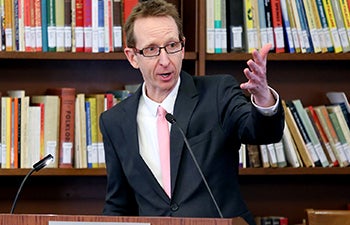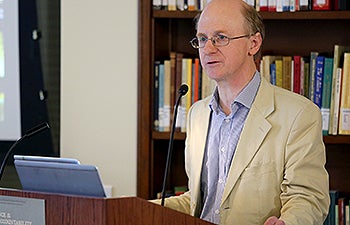Money Talks
In 1778, British Whig politician and statesman Edmund Burke flung the estimates of his country’s Naval expenditures — the so-called “Naval Extraordinaries” — across the floor of the House of Commons, hitting Treasurer of the Navy Welbore Ellis on the shins. The reason for Burke’s indignation? The presentation of such a fine gilt book of estimates, apparently calculated “to the utmost farthing,” was tantamount to treating the members of the House with contempt. Burke believed the purposes for which the money was granted were — by the Admiralty’s own bold admission — never meant to be applied.
“This is, in effect, a problem about contingency, about an estimate submitted one year that is often at wild variance with the outcome,” said Paul Seaward, director of the History of Parliament Trust in London. “Parliament never seemed to bat an eyelid about this,” he added, although the result of this system, or lack of one, was a huge Naval debt — an outcome, he said, that “was also taken on the chin by Parliament most of the time.
“The justification for that is that the Navy had to operate on credit and found it unnecessary to obtain funding beforehand,” Seaward added. “It was a very executive-minded way of looking at the whole process of funding the biggest item of government expenditure.”
Seaward was among several scholars who spoke at the first annual Linda and Harlan Martens Economic History Forum held on Feb. 12, 2015, at Doheny Memorial Library on USC’s University Park campus. An initiative of the USC-Huntington Early Modern Studies Institute (EMSI), housed at USC Dornsife, the day-long event looked at how examining state finance and political accountability in 18th-century Britain and investigating economic developments from the early modern era can offer critical insights on contemporary economic issues.
In his opening remarks, Interim Provost Michael Quick thanked USC Dornsife alumni and lifelong USC champions Linda and Harlan Martens for their generous support of the forum, noting that it holds great potential for positioning USC amongst the best institutions in the world for interdisciplinary economics and history research.

In his welcome remarks, Interim Provost Michael Quick stressed the opportunity created by the forum for interdisciplinary interaction between the humanities based at USC Dornsife and the Early Modern Studies Institute and USC’s professional schools.
“We want the Martens Forum to be a focal point for bridging the humanities based at USC Dornsife and the Early Modern Studies Institute with our professional schools such as USC Leventhal School of Accounting, USC Marshall School of Business, USC Sol Price School of Public Policy and USC Gould School of Law,” said Quick, senior vice president for academic affairs, and professor of biological sciences. “Creating that kind of interdisciplinary interaction is what USC is all about.
“This forum will also allow us to shed light on the importance of what we do as academics, the importance of discovery, observation and description of phenomenon, so that it can be used for the basis to inform policy and future discovery.”
Jacob Soll, professor of history and accounting at USC Dornsife, agreed. “Economic history has been, and remains, an elemental field that connects the humanities to politics, policy and society,” he said. “What the Martens Economic Forum shows is how USC can lead this vital field, in particular, by employing its unique interdisciplinary approach to producing scholarship with real-world consequences.”
Looking at past economic practices, including accounting, can help us discover what we can learn from the 18th century as we move forward, said Peter Mancall, Andrew W. Mellon Professor of the Humanities and Linda and Harlan Martens Director of EMSI.
“Many modern-day economic problems are actually accounting problems. By having this forum where we bring together experts who can tell us how these circumstances worked out in the past, we hope to have a larger discussion about the modern economy,” added Mancall, professor of history and anthropology and vice dean for the humanities.
An expert on British political history and the author of an innovative work on the history of accountability — a subject that until now has received little scholarly attention — Seaward spoke about building the parliamentary state, government finance and the routine of accountability from 1689 to 1800.
“In every attempt since the 18th century to explain the ascent of Great Britain to unprecedented wealth and global power, Parliament has played a, if not the, central role,” Seaward said. “Parliament in Great Britain has become a paradigm for understanding the mechanisms for building a successful fiscal state.”

British political history and accountability expert, Paul Seaward spoke about building the parliamentary state, government finance and the routine of accountability from 1689 to 1800.
However, Seaward questioned the effectiveness of Parliament itself as a vehicle for establishing a credible commitment. “It’s remarkable, despite an assumption that Parliament is one of the key pillars on which the fiscal state rests, how the whole debate on its development seems largely to ignore the role of Parliament itself,” he said.
As the unprecedented cost of a series of wars, particularly the Seven Years’ War, and the American Revolution helped to crystallize significant internal dissatisfaction with a political system during the 1760s and 70s, a more challenging system of accountability came to seem critical to ensure rule by consent and financial and international success.
“The difficulty for government was to develop a system that both overcame the dissatisfaction, while avoiding any unnecessary damage to political stability,” Seaward said. “They didn’t immediately succeed.”
Tracing Parliament’s enormous incapacity to ensure the accountability and responsiveness of the executives to the people, Seaward argued that it wasn’t until the 19th century that Prime Minister William Gladstone found a way to combine the authority of Parliament with routine tests of government and the real control of the permanent non-political bureaucracy in the Treasury to create a system of financial accountability that works. However, Seaward noted, it remains a system whose parliamentary credentials, the capacity for real political intervention and the detail of government finance, are still weak and questionable.
“The equation between the routine process of the fiscal state and the random and unpredictable nature of politics and the parliamentary processes remains still a far from straightforward one,” he concluded.
Other speakers at the Martens Economic Forum included Larry Neal, professor emeritus of economics at the University of Illinois at Urbana-Champaign, who spoke about accounting for the transition from personal to impersonal exchange in Britain’s financial revolution; William Deringer, postdoctoral fellow, Society of Fellows in the Humanities at Columbia University, who examined how 18th-century conflict about accountability for public money during Britain’s first financial crisis, the South Seas Bubble of 1720, generated new mathematical techniques which are still essential to modern mathematical analysis; and Tim Harris, Munro-Goodwin-Wilkinson Professor in European History at Brown University, who provided the closing comments. A roundtable discussion followed, hosted by Soll and Steve Hindle, W.M. Keck Foundation Director of Research at The Huntington Library.
“What the first Martens Economic History Forum shows is how early modern economic history can help us understand and make sense of the biggest problems facing us today,” Soll said. “We are excited to have the opportunity to continue this work in future forums.”